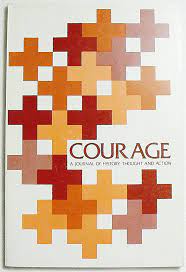Articles/Essays – Volume 06, No. 1
Courage | Courage: A Journal of History, Thought and Action
Robert Flanders, an exceptionally articulate and perceptive insider in RLDS matters, introduced readers of the Autumn, 1970, issue of this journal to the pilot issue of Dialogue’s RLDS cousin, Courage. What follows is an analysis of the first two regular issues of Courage by a sympathetic outsider.
The September, 1970, issue of Courage contains articles on the personality of Joseph Smith, problems in interpreting the Book of Mormon historically, the need for greater missionary activity, the desirability of in tensive involvement in the practical problems of the day, and a discussion by six observers of the RLDS 1970 World Conference. The December issue focuses on Vietnam, women’s liberation, whether to baptize polygamous converts in India, sources for studying the life of Joseph Smith III, and the need for divine help in understanding the Book of Mormon.
Each issue of Courage has several short signed editorials. Among other things the authors oppose student strikes, the Vietnam conflict, keeping historical sources locked up, the second-class status of women within both LDS churches, and the natural American tendency to assume our culture is superior to others. These editorials favor an open research policy, including women in top leadership positions, the possibility of ordination of women to the priesthood, the eradication of all forms of racism within the Church and the nation, and frank and open discussion of all problems relating to Mormonism. In addition to articles and editorials, there are documents (relating to the Nauvoo Temple and Nauvoo House Association), reviews of recent books, and letters to the editors.
The most provocative article is, in this reviewer’s judgment, Wayne Ham’s espousal in the September issue of a nonhistorical view of the Book of Mormon. Mr. Ham writes that “perhaps the time has come in the Church to recognize that some members want to openly espouse a nonliteral view of the Book of Mormon, treating it as a nonhistorical treatise in much the same manner as modern critics view the books of Jonah, Ruth, Job, and Daniel in the Old Testament. . . . These members could then read the book as a product of the American frontier and honor it as an interesting artifact of the Restoration movement in the nineteenth century, perhaps thus ‘enjoying’ this fascinating piece of literature for the very first time.” Mr. Ham is led to this view because he finds a number of “problems” in accepting the traditional Mormon interpretation. Among these problems are the contradictions in the accounts of how the book came forth; the lack of any non-LDS archeological support for Book of Mormon claims; the book’s emphasis on contemporary frontier concerns; moral teachings difficult to accept (e.g. the slaying of Laban by divine decree, the notion that certain dark skinned people were cursed, and that God commands wars and destruction); extensive parallels between the Book of Mormon and the King James version of the Bible; and words and concepts used in the book which are believed to have been used or developed later in time.
Most of these problems have been extensively debated before. Several long letters to the editor in the December issue opposing Mr. Ham’s position continue that debate. One questions his sanity; another calls him a rabble rouser; a third wants him fired from his job. What is new and more interesting is Mr. Ham’s reply to his detractors. Mr. Ham does not attempt to defend his original article, but alleges that a member who cannot affirm the historicity of the Book of Mormon is just as acceptable to Christ as one who thinks the book is perfect in every respect. He asserts, and there is a good deal of hard evidence elsewhere to support him, that Mormons already exhibit a certain pluralism in their theological beliefs, that we might as well recognize this openly, and that witch hunts and heresy trials should be a thing of the past.
This exchange between Mr. Ham and his opponents is part of a larger liberal-orthodox split in the RLDS faith. This split is openly discussed by six observers of the 1970 RLDS World Conference in the September issue. What is striking to the outsider is the non-authoritarian frankness and open mindedness of the RLDS General Authorities who comment. (The mere fact that a General Authority would write for Courage will come as a pleasant surprise to most Dialogue readers.) Russell F. Ralston, an apostle, believes for example that his church is too provincial. Maurice L. Draper, a member of the First Presidency, in defending his church’s position on monogamy, never implies that he is speaking for the Lord or that any disagreement with him is tantamount to heresy. In the long run this attitude will serve the RLDS organization well. So, one hopes, will Courage.
Courage: A Journal of History, Thought and Action. Venture Foundation, 106 East South, Lamoni, Iowa 50140. Vol. 1, Nos. 1 and 2 (September and December, 1970), $6.00 per year.


 Back to full Issue
Back to full Issue

